First, do no harm.
It’s an oath sworn by physicians and a pledge that every traveler should make as well. As guests in the places we visit the very least we can do is respect our hosts by not hurting their country or their people.
Unfortunately such pledges are easier made than kept. That’s especially true in areas of the world that lack strong regulations protecting vulnerable populations. It’s not uncommon to see plenty of exploitive activities marketed to tourists. And sometimes those activities are even cleverly disguised to prey on our very desire to do good.
Visiting and volunteering in a children’s orphanage in Cambodia, for example, sounds like a good way of directing your travel dollars to a worthwhile cause. That is until you learn about the fake orphanages that separate children from their parents for the sole purpose of separating tourists from their money.
So how do you travel ethically when unscrupulous tour operators do every thing they can to hide the truth of their operations? Here are some suggestions.
First, pledge to do no harm
The first step toward traveling ethically is recognizing that the responsibility falls on us as travelers. Too few of us do. Oftentimes travelers assume that if an activity is offered it must be okay; that surely some regulator or authority has vetted it and is monitoring things to curb abuse. Unfortunately, that is not always the case.
Many places lack strong regulations or effective oversight. Some are rife with corruption while others are plagued by indifference. In those cases it is up to the travel community to impose its own regulation on the industry by supporting ethically run operations and withholding its travel dollars from those that fall short.
But doing so requires us to first recognize that we play a role in determining whether abusive practices continue. Only then can we play our part in assuring that they don’t.
Question your motives
Each of us is devilishly creative when it comes to convincing ourselves that it’s okay to do the things we want to do anyway. Behavioral scientists call it “motivated reasoning,” and we’re all guilty of it to some degree. It happens when you let your conclusion drive your analysis instead of the other way around.
You’ll see that process unfold again and again in the comments section of our post about Why we won’t travel to North Korea. The most damning arguments we raised in that article were ones we haven’t seen published anywhere else. And yet not a single critic of ours attempted to engage with those arguments. Mostly they had already decided that travel was good, and they didn’t worry themselves about things that might conflict with their preconceived notions.
That’s motivated reasoning in action. And it’s something we all have to guard against.
The problem is we don’t usually know that we’re doing it. We think we’re analyzing a situation when what we’re really doing is looking for evidence that supports our conclusions. The only way to fight against that is to be aware of our tendency toward motivated reasoning and deliberately work against it by seeking out conflicting views and possibly even defer to them in instances where the chance of causing harm is great.
Follow the money
Money is indeed the root of all evil. And like every other profession on the planet, an unregulated tourist industry will do unsavory things if it means garnering more of that filthy lucre for itself. And when there is money at stake, you can’t expect your tour operator to tell you anything other than exactly what you want to hear.
If he knows you’re concerned about child labor, he’ll tell you the children you see are on break from school and are “just playing” at picking coffee with their parents. If you’re concerned about animal mistreatment or ecological destruction, he’ll give you every assurance that none of those things are happening.
The way to see through these kinds of lies is to consider the incentives your tourist dollars create. If you’re paying to see kids in an orphanage, you’ve created a profit motive for someone to stock up on sad looking children separated from their families. If you’re paying for a selfie with a tiger, you’ve just made it worthwhile for someone to breed wild animals in captivity and either beat or drug them until they’re submissive enough to pose for you. If you’re paying to photograph communities of Kayan (or long-neck) women in Thailand, you’re contributing to a business whose sole product is disfigured women. Keeping that business going over the long-term requires inducing (or forcing) young girls into similar disfigurement.
Decide that living creatures are not tourist attractions
It’s not always easy to untangle the economic impacts of tourism. And you’re sure to encounter competing claims of offsetting benefits. The most common is that tourism revenue helps local communities, and in some cases it does. That’s especially true when you’re traveling independently and patronizing family owned businesses. But how much money filters down to local communities from more organized tours is simply not possible for travelers to know.
In such cases it’s clarifying to resort to first principals. People are not tourist attractions. Any activity that puts people on display like zoo animals is very likely exploitive.
The same actually goes for animals as well. Caging, breeding, and breaking animals for human entertainment is not something we personally choose to support, especially since there are so many ethical alternatives available. But mostly because seeing animals in the wild is far more rewarding than seeing them in captivity. Once you watch orcas swimming in the ocean, the idea of visiting a place like Sea World just makes you feel sad.
Keep your travel and charity separate
We’ve seen so many instances where travelers’ good intentions are twisted by conmen that we’ve come to the conclusion that it’s often (although certainly not always) better to keep travel and charity separate. Instead of giving to child beggars, we give to organizations like Heifer International. Instead of visiting places like North Korea, we give to the International Rescue Committee.
We try to find and support reputable aid organizations serving the countries we visit while mostly avoiding tourist attractions that purport to also be charities.
Research your options
The above recommendations, especially the last one, could end up steering you away from small local organizations that actually do good work. That would be tragic. To reduce that risk these suggestions should be read as a list of guidelines rather than a set of absolute rules.
Use your intuition to sniff out bad actors. If something looks like it uses people or animals as a means rather than treating them as an end, it’s probably not an organization you want to support. In cases where that isn’t clear, a quick internet search about the organization usually turns up any complaints people have. If the complaints seem legitimate, then maybe the best choice is to skip the activity and give that tour money to a relevant charity instead.




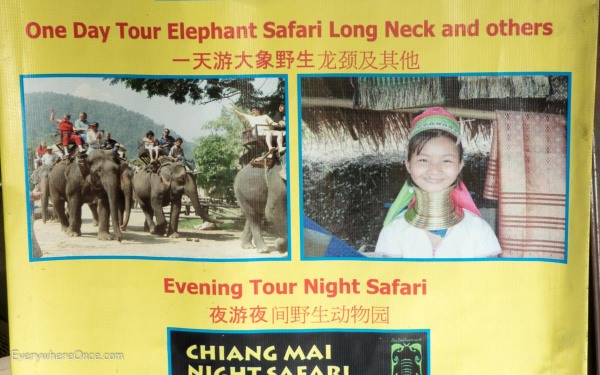

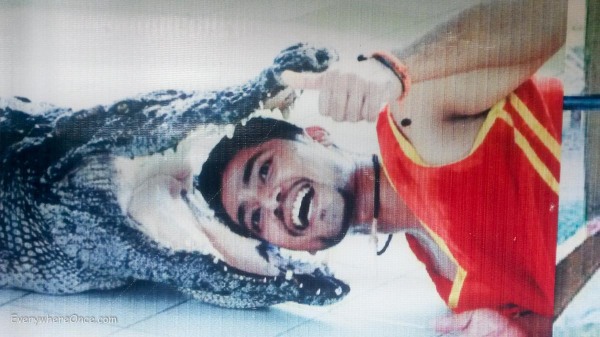



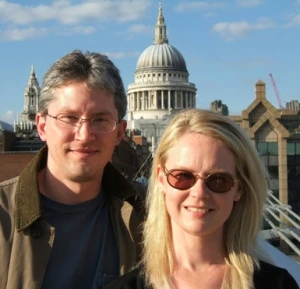

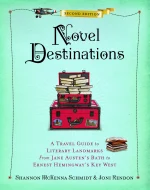
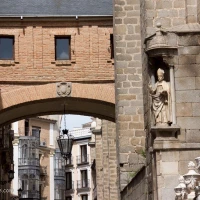

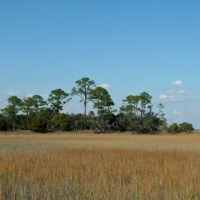

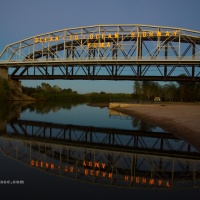





Excellent post. You express your approach so clearly, thanks. It saves me having to! One thing I might add to your comment in family run tourism actiities. Also try to find out community run activities. They may be informal run by the local communit or more formalized as a part of a structured Programme to to build sustaianable businesses in communities that would otherwise have no means of generating incomes or, worse, be exploited by third parties. Namiba’s conservancies are a good example. Community organizations with elected management committees, run to achieve twin goals of conservation and sustainable development. And they have some of the best campsites!
LikeLiked by 1 person
There are lots of good organizations like that. We’ve been dining at a few. One in Thailand (Freebird Cafe) that donates all profits to Burmese refugees and one in Luang Prabang that trains and employs underprivileged locals in the kitchen and the dining room.
The nice thing about organizations like this is that we don’t have to really vet them too hard. The worst thing that happens if they’re bogus is that we overpay for a meal.
LikeLiked by 3 people
I love you it too much
LikeLike
Reblogged this on digger666.
LikeLike
An eye-opening read for me!
LikeLike
We endeavor to be helpful. Sometimes we even succeed. 🙂
LikeLike
Excellent post! I’ve shared on Twitter and Facebook. As travelers and tourists, we should all strive to make choices that reflect our values, and “do no harm” is an important one for many of us.
LikeLiked by 1 person
Thanks for sharing. 🙂
LikeLike
I really appreciate this post. We too try to be responsible when we travel, hence our name “Intentional Travelers.” Having lived two years as Peace Corps Volunteers in a country dependent on tourism, we have seen many downsides of travel. But there are certainly ways to do no harm if you’re willing to put some intentional effort into your planning.
LikeLiked by 2 people
Absolutely!
LikeLiked by 1 person
Reblogged this on and commented:
Take only memories and photographs, land leave it better than you found it.
LikeLike
YEES!!! to everything in this post! Thank you!
LikeLiked by 1 person
Excellent read! Echoes what I think myself and sometimes fail to explain 😉
LikeLiked by 2 people
Good start. Part of the Hippocratic travel oath …is in photos put the local people in the centre of the photos, not yourself.
Or not have primarily landscape, plant or animal photos, but for crying out loud,….the local people. They aren’t the landscape..they are you and I, in flesh.
I like this blog post theme which can be expanded.
LikeLike
Interesting thoughts.
People are a big part of any destination but you might have noticed they’re not a big part of our photography. That’s because I think photographing people is very personal. I usually only do it if I’ve established some kind of rapport with them. That takes some time and doesn’t yield many photos.
LikeLiked by 3 people
I have never wanted to take a picture of a local person, because I always thought it degrading. .. they are people, not tourist attractions.
What do you think? Is it offensive?
I travel a lot, and definitely don’t want to be disrespectful.
LikeLike
It can be disrespectful, but doesn’t have to be. At the very least always ask permission. Even better, start by having a conversation with the person.
LikeLiked by 1 person
Pretty much anywhere I travel to I have friends or family. Which means I haven’t been to Asia yet, but a few friends of mine have been to Japan and China on business trips and later as tourists – and they speak the language. It’s a safe bet that wherever your friends and family who live in the foreign countries take you, you won’t be wasting your money on con artists. If you’re short on friends and family, couchsurfing hosts will ne able to help you out. You needn’t stay over night at a couchsurfing host if you’re staying in a hotel, you can just invite them for coffee.
LikeLike
Interesting. We’re familiar with couchsurfing but never thought to engage a host who’s couch we weren’t surfing. Sounds like a great idea.
LikeLike
Reblogged this on placesfacesfeasts.
LikeLike
I really like your article, although I struggle with one point. You say one should consider living animals as living creatures. Nevertheless, you pose for a picture with a macaque on your shoulder. Those monkeys are mostly stolen at a young age from the wild, from their loving mothers and supporting group to live in a small cage, where they are “released” from at touristic places to let tourist take pictures with them. The metal chain on its neck actually says everything: This monkey did not chose to be there.
This is no offense, as I know most people don’t know what they are supporting when posting for photos with monkeys or other exotic animals. Or even when buying exotic animals as pets.
LikeLiked by 1 person
You have a keen eye and have me dead to rights.
That photo was taken some years ago when I was a less thoughtful traveler. It’s a photo I’ve used for so long that I guess I’ve kind of stopped seeing it. That is definitely not something I’d do today. Therefore it’s not a photo I should be using as my avatar and I’ll look for a suitable replacement.
Thanks for calling bullshit on this.
LikeLiked by 2 people
I’m happy to hear that. 🙂
LikeLike
I agree wholeheartedly with the ethos of avoiding doing harm.
LikeLike
Reblogged this on surfsensei and commented:
I decided several years ago not to continue leading “challenge” school trips abroad, usually groups of around 20 young people, because I felt groups of this size created an adverse impact on people in the more remote areas where resources are tight. I also saw too much “let’s photograph the ‘exotic’ people” to feel comfortable being a part of that business. If I’m not doing something of real benefit, I begin to question why I’m there; it’s no longer enough for me just to see a beautiful view.
LikeLike
Thanks for this. I wrote some time ago about the elephant tourism industry, just heart breaking. http://penpaperstorm.wordpress.com/2013/06/18/the-tragedy-of-elephant-tourism/
LikeLike
Love Chaing Mai
LikeLike
Reblogged this on Cybersummit Symposium 2014.
LikeLike
Reblogged this on Mi vida en España.
LikeLike
Reblogged this on galesmind.
LikeLike
If you take the rings off they will die
LikeLike
Reblogged this on natelangdon27382.
LikeLike
Great post! I’ve been lucky to travel quite widely but the older I get the more I consider these things. The treatment of animals in other counties is so vastly different to what we would consider acceptable here in the UK. We went to Malaysia this year and while there visited a aligator park, my husband really loves animals and we thought it would be a conservation type of place. We were sadly very wrong. It was totally horrific. We arrived just in time for a show with animals which were clearly drugged and being taunted and manhandled in a way which was very upsetting. Needless to say we turned around and walked right out. Unfortunatlely there were loads of tourists there lapping it up and taking photos. I can only hope my review on trip advisor will discourage other people from going there!
LikeLiked by 1 person
I think raising awareness is the best way to make a difference. If people stop paying for these kinds of things, they’ll stop happening.
LikeLiked by 1 person
Reblogged this on Traveling Tulls.
LikeLike
A real eye opener. Thanks
LikeLike
Reblogged this on Lyle Harrison and commented:
Think again when twice local tours.
LikeLike
I’m so tired and the only way I
LikeLike
Reblogged this on a Very Small Animal and commented:
I remember feeling sick when I watched a group of people (I assumed tourists) taking photos of a dancing bear in Moscow. I was more horrified that they couldn’t see that the animal was so obviously sick and in pain than the spectacle itself.
LikeLike
Wow! What a concept! Do no harm? Well, better late than never, humans! Read this article and get a clue! Wise up and don’t rude. And I know it’s fun to ride elephants, but would you like to have some moron riding you? Don’t ride these SLAVES that are tortured and kept in prison their entire lives. Be a nice human. Support humanity, not cruelty. You can do it!
LikeLike
Reblogged this on Earth Speaks Out and commented:
Wow! What a concept! Do no harm? Well, better late than never, humans! Read this article and get a clue! Wise up and don’t rude. And I know it’s fun to ride elephants, but would you like to have some moron riding you? Don’t ride these SLAVES that are tortured and kept in prison their entire lives. Be a nice human. Support humanity, not cruelty. You can do it! http://www.earthspeaksout.com
LikeLike
Reblogged this on allyouneedisriley.
LikeLike
Reblogged this on A Modern Itch.
LikeLike
Reblogged this on priyangthinks.
LikeLike
A well thought out post. Thanks. –Curt
LikeLike
Reblogged this on delfiannatens.
LikeLike
So well written! Perfect! If only everyone would read it and then travel ethically …
LikeLike
Reblogged this on Mud 'n Feathers.
LikeLike
Enlightening!
LikeLike
This is brilliant! Thank you, thank you, thank you for such a poignant, organized expression of ethical travel. I often marvel at the same injustices in the international tourist industry. While in Hanoi, Vietnam, I heard all about the ever-popular “Snake House” where snakes would be tortured before tourists consumed every part of the snake. The greatest attraction being the chance to eat the beating heart. Sadly, this business is perpetuated by the lure of an “unique” experience that in reality is sought out by unethical hoards of backpackers. I often write about the differences between travelers and tourists. You are travelers to the core. Cheers to the beauty of this world and treating it with the upmost respect!
LikeLike
I recently reblogged a post written by a young (white) American woman who has always wanted to travel and was basically saying how to do it the broke way, by working while in other countries on work visas, and then saving up money, staying in hostels/other housing geared towards low income individuals. My comment on the post was basically what you’re saying, but I said it so much less eloquently. Thank you!
LikeLike
I love it
LikeLike
Wonderful post! Was so pleased to hear the Intrepid have stopped doing elephant rides on all tours this year.
LikeLiked by 1 person
Thank you for this extraordinary + thoughtful post!
LikeLiked by 1 person
Such a necessary reminder for people to really pause and consider their impact and own motives. Your post will send out ripples of good in the world. Thank you!
LikeLiked by 1 person
Thanks for this. I often travel with graduate students, and I work very hard to instill in them the necessity of ethical practices in tourism. It is frequently difficult to separate out the wheat from the chafe, though. Using a highly reputable local travel agent and doing quite a bit of background research ahead of time can help identify frauds.
LikeLike
Reblogged this on ayeshawaheed.
LikeLike
Reblogged this on mrrobin86's Blog.
LikeLike
Reblogged this on mjjoshim.
LikeLike
Now actually read the oath. You haven’t. Have you?
LikeLike
Yes, I have and I’m aware that the phrase “First, do no harm” originated in the 19th century whereas the original Greek version said something to the effect “I will take care that they suffer no hurt or damage.”
What’s your point? And more importantly, how does that point relate to the topic of the article you’re commenting on? It doesn’t. Does it?
LikeLike
Excellent perspective! It’s a good thing that we keep it in mind. Specially when we’re travellers.
LikeLiked by 1 person
“Keep your travel and charity separate”
That is true and agree with you. South East Asian tourism business actually do this a lot in the name of sustainability tourism. It could be good but also wrong as we are often don’t know if the tourism impacts to local community.
LikeLike
Reblogged this on laru004's Blog.
LikeLike
Reblogged this on laru004's Blog.
LikeLike
Excellent. This is fantastic. As somewhat of a gypsy wanderer who never wanders too, too far away (for the time being) my family adheres to some very strict rules of travel. Since the implications involved in our travel as much less grave that the instances you described in your post, all three of my kids (ages 4, 7 and 10) all follow some general rules. The two older kids are scouts, and my Cub Scout (having learned the “leave no trace” concept of BSUSA, adheres to the GIRL SCOUT concept of “leave a place better than you found it.” Teaching social responsibility is imperative. It is more than giving blindly to apparently good causes. It is giving of your time, talent, and resources WISELY and responsibly. You illustrate this perfectly. Having grown up in Panama in the 1980s, I see how easily some people can be exploited for money– both in asking for it and in giving it. You make some VERY good points, and I hope people can learn from it!
-J
http://www.adventuresofthecrazytrain.com
LikeLiked by 1 person
Reblogged this on bigbabycaro.
LikeLike
Yees!!! To everything in this post ! Thank you!
LikeLike
Reblogged this on jonjominns's Blog and commented:
This is something I do personally. I think is essential we respect our hosts whilst travelling. Really enjoyed reading this. Thanks.
LikeLiked by 1 person
Reblogged this on mdjhanif.
LikeLike
Elephant nature park in chaing mai thailand is amazing, but i wanted to add with the long neck villiage, as i spoke to one of the older ladies on why they do this it’s because are keeping their culture alive and by opening up their villiage to tours is giving them money.
LikeLike
Yes, I’m quite sure there were older women who mourned the cultural loss of foot binding and people today who fight to preserve the practice of genital mutilation but that doesn’t mean I want to support or encourage those kinds of things.
LikeLike
Reblogged this on the adventures of jeff and sarah… and commented:
Sarah and I have been travelling now for a couple of years now, this is a great article and a great idea for everybody to think about when they go about their travels in 2015. Thank you to http://everywhereonce.com for the great article. Please check out their site!
LikeLike
So true, I shared your post to Facebook and Twitter. 👍
LikeLike
Yes. There are nice ways to travel in balance with nature and with respect for all beings. Be mindful in every moment!
LikeLike
Reblogged this on journeyingbeyondborders and commented:
An insightful read –
LikeLike
Reblogged this on kayodejonathan's Blog and commented:
We have treasures passed down to us from the ancient. Among these treasures are the moral codes. Since the vocabulary changes with different ages and new vocations: we find it hard to interpret and adapt or adopt them.
Here is the interpretation of some of these moral codes that we should necessarily adopt.
LikeLike
Nice
LikeLike
The oath is voluntary
only. But atleast lawyer dont lie.
LikeLike
Nice post.
LikeLike
Reblogged this on lindalounelson.
LikeLike
Reblogged this on silentohm and commented:
Good read for anyone traveling afar.
LikeLike
Great post! If you are concerned about animal’s welfare and their misuse as tourist attractions you can report it to this side: http://www.bornfree.org.uk/campaigns/zoo-check/travellers-animal-alert/
LikeLike
Great tip. Thanks for sharing!
LikeLike
Great post and something all travelers need to strive towards. I will be volunteering around the world over the next year and hope to draw attention to small, grassroots organisations rather than ‘voluntourism’.
LikeLike
Reblogged this on ROBERT CULLEN'S 3S BLOG and commented:
From “fulltime wanderers” Brian & Shannon who are “traveling the world on a quest to see everything there is to see . . . at least once”, here a great post for all travelers: How to make and keep a traveler’s Hippocratic Oath. #3S #Satisfaction #travel
LikeLike